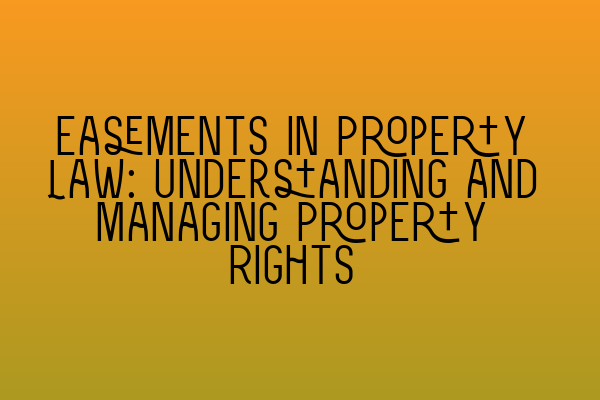Easements in Property Law: Understanding and Managing Property Rights
Welcome to another informative blog post brought to you by SQE Property Law & Land Law. Today, we will be diving into the world of easements in property law, discussing what they are, how they work, and how property owners can effectively manage their property rights.
What are Easements?
Easements are a vital aspect of property law that grants certain rights to property owners over neighboring properties. In simple terms, an easement allows for the use or enjoyment of another person’s land without possessing ownership of it. These rights are typically established through written agreements or are created automatically by law to ensure the fair and efficient use of land.
Understanding the Types of Easements
Easements can come in various forms, each with its own set of characteristics and implications. Here are some common types of easements in property law:
1. Right of Way Easement: This type of easement grants someone the right to pass through the property of another person. It is commonly utilized in situations where there is a need for access to public roads or other properties that are otherwise inaccessible.
2. Easement by Necessity: An easement by necessity arises when a landlocked piece of property needs access through another property in order to reach a public road. This type of easement ensures that property owners have reasonable access to their land.
3. Easement by Prescription: An easement by prescription is established when someone has continuously and openly used another person’s property without permission for a prescribed period of time. In such cases, the law may recognize this usage as a legal right.
4. Easement by Estoppel: This type of easement arises when a property owner leads another person to believe that they have certain rights to use their land. If the person acts based on that belief, the easement may be created to prevent unfair actions by the property owner.
Managing Easements effectively
Now that we have a basic understanding of what easements are, it is crucial for property owners to effectively manage and protect their property rights.
1. Consult with a Solicitor: Before purchasing a property, it is advisable to consult with a solicitor who specializes in property law. They can provide invaluable guidance and advice, ensuring that you have a clear understanding of existing easements and any potential implications for future use.
2. Review Title Deeds and Surveys: As a property owner, regularly reviewing your title deeds and surveys can help identify any existing easements and assess their impact on your property. This will also help establish any potential easements that may benefit your property.
3. Negotiate and Draft Clear Easement Agreements: When entering into an easement agreement with another party, it is crucial to negotiate and clearly define the terms and conditions. This includes specifying the scope of the easement, any restrictions, time limitations, and any associated costs.
4. Engage in Open Communication: Maintaining open communication with your neighbors and other parties involved in easement agreements is essential. This ensures that all parties are fully aware of their rights and responsibilities, reducing the likelihood of disputes arising in the future.
Conclusion
Easements play a crucial role in property law, ensuring the fair and efficient use of land. Understanding the different types of easements and effectively managing property rights is essential for property owners. By consulting with solicitors, reviewing title deeds and surveys, negotiating clear easement agreements, and engaging in open communication, property owners can protect their interests and prevent potential conflicts.
If you found this blog post informative, make sure to check out our related articles:
– SQE 1 Practice Exam Questions
– SQE 1 Practice Mocks FLK1 FLK2
– SQE 2 Preparation Courses
– SQE 1 Preparation Courses
– SRA SQE Exam Dates
At SQE Property Law & Land Law, we are dedicated to providing expert legal advice and services to property owners. Contact us today for all your property law needs.
